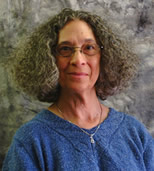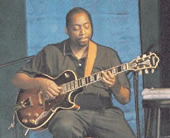|
Understanding
American culture means understanding the blues
By Michelle
Hall
Harriet Ottenheimer
and Wayne Goins have the blues.
Ottenheimer,
professor of anthropology at Kansas State University, and Goins, associate
professor of music, have been interested in the musical phenomenon since
they were children, studied it in college, played it professionally and
now teach it in their anthropology and music courses. And this year, in
recognition of the "Year of the Blues" in the United States,
they are teaching an entire course on the blues.
 Ottenheimer,
pictured at left, said although many people like to listen to the blues,
not many know where it came from or what it means. Ottenheimer,
pictured at left, said although many people like to listen to the blues,
not many know where it came from or what it means.
"If
they like the music, they should understand where it comes from,"
she said. "People don't realize the extent to which American culture
is African-derived."
Goins, pictured
below, said he feels it's important for people to understand the social
atmosphere the blues grew out of.
"People
don't have 'the blues' anymore," he said. "It's foreign to us
the way the blues evolved -- we have too little to cry about now. We feel
like blues should be more a part of American culture."
The blues
developed in small cities along the Mississippi and Ohio rivers in the
1890s and made its way to the delta in the early 1900s. It was an early
party music developed by the children of former slaves, Ottenheimer said.
Its musical and cultural foundations come from Africa, Europe and the
Middle East.
But the blues
have also generated plenty of controversy, Ottenheimer said. Scholars
disagree over where in Africa the music originated, and when and where
the first documented encounter in America with the music occurred.
"If
you want to understand American culture, you need to also understand the
blues, and the contexts in which it developed and flourished," she
said.
In September
2002, the U.S. Congress proclaimed 2003 as the "Year of the Blues,"
to celebrate the 100th anniversary of African-American composer W.C. Handy's
encounter with the music in Tutwiler, Miss. The "Year of the Blues"
celebration brings together blues events, a radio and film series, concerts,
festivals and educational initiatives.
|
How
they got the blues
Kansas
State University professors Harriet Ottenheimer and Wayne Goins
took different paths to get to their love of and interest in the
blues.
Growing
up in Chicago, blues was the first style of music Goins learned
to play on the guitar. His father was a harmonica player and his
uncle, a blues guitarist who gave Goins his first gigs. Goins said
he fell in love with the warm sound of the blues guitar on 45s,
78s and albums, which, he says, is "something the younger generation
can't appreciate with the advent of the CD."
"Man,
the warmth of the vinyl just made me imagine being there on the
recording sessions," he said. "Every song I heard, I pretended
I was there in the studio, making the music with them. The passion
with which guys like Muddy Waters, B.B. King, Lightnin' Hopkins,
Howlin' Wolf sang was overwhelming to me and I just knew I had to
get closer to that music. If I could have crawled inside the turntable
and through the hi-fi to get to those men, I would have in an instant.
"I'm
still in love with it all."
Goins
continues to play jazz and blues music professionally, and has played
on Broadway for Pearl Cleage's "Blues for an Alabama Sky."
Ottenheimer's
father was a "blues fanatic," she said. Her family would
listen to records and attend concerts in the late 1940s and early
'50s, where she became an "autograph hound."
"I
grew up in love with this music in New York City," Ottenheimer
said. "Going to concerts and meeting the musicians just blew
me away. I wanted to know more, and I wanted to be a part of it
all, to understand it all. What did it really mean, for example,
to have 'trouble in mind?' or to be 'laughing to keep from crying?'"
In
college, she started out with a major in music and switched to anthropology
and enthnomusicology for graduate school. By then she had learned
the guitar and was playing in coffee houses and bars -- her specialties
were blues and folk. Ottenheimer even wrote her doctoral dissertation
on blues singing in New Orleans.
She
continues to teach, research and write about the blues and has published
numerous articles on the subject. Her book "Cousin Joe: Blues
from New Orleans," was published by the University of Chicago
Press.
"I
will probably always love the blues," Ottenheimer said. "Blues
has an amazing ability to capture the most overwhelming experiences
and emotions and to put them into words and music. The music and
the lyrics can touch you emotionally like almost nothing else. It's
cultural, it's personal and it's poetic."
|
Fall 2003
|